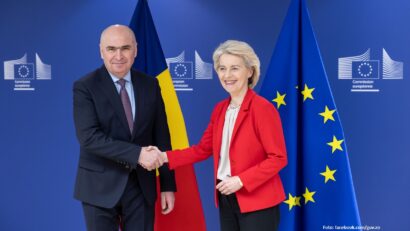Brexit Officially On
PM Theresa May signed the letter that formally begins the UKs departure from the European Union.

Bogdan Matei, 29.03.2017, 12:46
The UKs withdrawal from the European Union has been officially initiated, with the triggering of Art. 50 of the Treaty on the European Union. The head of the British Government, Theresa May, signed the letter notifying the process to the President of the European Council, Donald Tusk. According to community procedures, the letter is also forwarded to the European Commission and to the Conference of the leaders of political groups in the European Parliament.
After the referendum last summer, when a majority of Britons voted for the UK to leave the EU, the European Union announced that, during negotiations, the unity and interests of the 27 remaining members will be a priority. Moreover, it warned that the single market and the four freedoms, namely free movement of goods, services, capitals and people, go hand in hand.
Radio Romanias correspondent in Brussels says that the European Parliament is expecting the British PM to quickly clarify the legal status of the EU citizens living in the UK. The Unions chief negotiator, the French Michel Barnier, hopes that a partnership with London might be reached by October 2018. Until then however, Barnier says, a judicially complicated and politically sensitive process will follow, and its economic impact on both sides will be huge.
Still disgruntled with the results of the vote, thousands of Londoners rallied once again on Saturday, to protest Britains decision to leave the Union. In turn, the Parliament of Scotland decided that a new referendum would be held regarding Scotlands independence from London. Most of the Scotts and Northern Irish people voted that the UK should stay in the EU. And while in a 2014 independence referendum 55% of Scotlands citizens had decided to remain a part of the United Kingdom, now First Minister Nicola Sturgeon says the two should go separate ways. She warns that Scotland, and the UK as a whole, are at a crossroads.
And in fact, Europe as we know it is facing a turning point. Over the past six decades, the Union has expanded steadily, with 22 new countries joining the 6 founding member states. Britains leaving is the first step backwards so far, but it is also a warning that Brussels, often accused of excessive bureaucracy, inefficiency and indifference to the expectations of common people, has spent up the confidence that citizens had placed in it.
On Saturday in Rome, where they celebrated 60 years since the EU founding treaty was signed, the leaders of the remaining member states pledged to make the EU stronger and more resilient. On behalf of Romania, President Klaus Iohannis said the informal summit in Rome was both a celebration, and an opportunity to look back and draw some conclusions. “Preserving the unity of the 27 member states is and must remain our goal in the future, the Romanian President concluded.
(translated by: Ana-Maria Popescu)






























